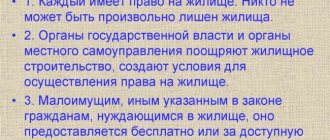- Grounds for termination of ownership of a land plot
- Grounds for termination of the right of permanent (indefinite) use of a land plot, the right of lifelong inheritable ownership of a land plot
- Grounds for termination of land lease
- Grounds for termination of gratuitous fixed-term use of land
- Grounds for termination of easement
- Confiscation, including through redemption, of land plots for state or municipal needs
Grounds for termination of ownership of a land plot
The right of ownership of a land plot is terminated when the owner alienates his land plot to other persons, the owner renounces the right of ownership of the land plot, and due to forced seizure from the owner of his land plot in the manner established by civil legislation (Article 44 of the Land Code of the Russian Federation). This list of reasons should be considered exhaustive.
Alienation by the owner of his land plot to other entities is possible on the basis of an agreement. Citizens and legal entities are free to enter into contracts. Its conditions are determined at the discretion of the parties, except in cases where the content of the relevant condition is prescribed by law or other legal acts (Article 421 of the Civil Code of the Russian Federation). The agreement must comply with the rules obligatory for the parties, established by laws and other legal acts (imperative norms) in force at the time of its conclusion (Article 422 of the Civil Code of the Russian Federation). There are separate imperative norms, for example, in the Land Code of the Russian Federation (Articles 27, 52) and other federal laws.
The owner has the right to unilaterally abandon the land plot belonging to him. In this case, he submits an application for refusal to exercise ownership of the land plot to the local self-government body in charge of the relevant lands. From the moment the application is submitted, the land plot acquires the legal status of an ownerless immovable property. The procedure for terminating rights to it is established by civil law. Ownerless real estate is accepted for registration by the body that carries out state registration of rights to real estate, upon application from the local government body in whose territory they are located. After a year has passed from the date of registration of an ownerless immovable property, the body authorized to manage municipal property may apply to the court with a demand to recognize the right of municipal ownership of the ownerless land plot. If this land plot is not recognized by a court decision as having come into municipal ownership, it may be again taken into possession, use and disposal by the owner who left it, or acquired into ownership by virtue of acquisitive prescription (Article 226 of the Civil Code of the Russian Federation).
The grounds for forced seizure from the owner of a land plot may be the guilty actions of the owner of the land plot or other circumstances.
The guilt of the owner of the land plot is proven when the land plot is confiscated in connection with its use by the owner not in accordance with its purpose (Article 284 of the Civil Code of the Russian Federation) or with a gross violation of the rules for the rational use of land, including misuse of the land plot (Article 285 of the Civil Code RF), upon confiscation of a land plot by a court decision in the form of a sanction for committing a crime (Article 50 of the Land Code of the Russian Federation).
Other circumstances for the seizure of a land plot from the owner may be its purchase for state or municipal needs or requisition in the manner established by federal law.
Legislation
The Land Code of Russia regulates the basic procedure, specifics and features of the termination of ownership of a plot of land in the state.
According to Article 35 of the Constitution, property rights in the Russian Federation are protected and protected by law, and any termination of property rights is possible only on the basis of a court decision. At the same time, the law allows the alienation of property: both forced and voluntary, both with subsequent payment of compensation and without it.
- In the Land Code of the Russian Federation, the entire seventh chapter is devoted to the termination of property rights.
- Thus, Article 44 regulates the grounds for termination of ownership of a plot of land in Russia.
- The next article, Article 45, describes the grounds for termination of the right of inheritance or perpetual use of land.
- Article 49 talks about cases when it is permissible to purchase land plots for state or regional needs.
- The 50th article describes the process of confiscation of land, and the 51st requisition.
- Articles 52 and 53 describe both the procedure for alienation and relinquishment of ownership rights, and the conditions that must be present.
- Article 55 regulates the seizure of land for municipal or state needs.
Article 209 of the Civil Code gives a person the full right to dispose of his property at his own discretion, if his actions and desires do not contradict legal norms.
Thus, Article 209 allows for the alienation of one’s own property in favor of other persons, as well as for selling, transferring, etc.
Grounds for termination of land lease
The lease of a land plot is terminated on the grounds and in the manner provided for by civil law. It establishes the possibility of early termination of the contract at the request of the lessor (Article 619 of the Civil Code of the Russian Federation) and early termination of the contract at the request of the tenant (Article 620 of the Civil Code of the Russian Federation). In addition to the grounds specified in the Civil Code of the Russian Federation, the lease agreement may establish other grounds for its early termination at the request of the lessor or lessee.
At the same time, the Land Code of the Russian Federation provides for a number of grounds on which the lease of a land plot can be terminated at the initiative of the lessor. They recognize:
- use of a land plot not in accordance with its intended purpose and belonging to one or another category of land provided for by land legislation;
- use of land that leads to a significant decrease in the fertility of agricultural land or a significant deterioration of environmental damage. This basis does not apply during the period of agricultural work and in other cases established by federal laws;
- failure to eliminate the consequences of a deliberately committed land offense, expressed in poisoning, pollution, damage or destruction of the fertile layer of soil due to violation of the rules for handling fertilizers, plant growth stimulants, pesticides and other dangerous chemical or biological substances during their storage, use and transportation, resulting in damage harm to human health and the environment;
- non-use of a land plot intended for agricultural production or housing or other construction for the specified purposes for three years, unless a longer period is established by federal law or a land lease agreement, with the exception of the time necessary for the development of the land plot, as well as the time during which the land plot could not be used for its intended purpose due to natural disasters or other circumstances precluding such use;
- seizure or requisition of a land plot for state or municipal needs in accordance with the rules established by the Land Code of the Russian Federation.
Commentary on Article 44 of the Land Code of the Russian Federation
The list of grounds for termination of ownership of land given in the article generally corresponds to the norm of Art. 235 of the Civil Code of the Russian Federation on general grounds for termination of property rights. However, the Civil Code of the Russian Federation also mentions the termination of property rights in the event of loss or destruction of property - in relation to land, such a situation is impossible: even in the case of land degradation, violation of soil cover, the land plot itself does not disappear anywhere. In addition, the mentioned article of the Civil Code of the Russian Federation names the possibility of establishing by law other cases of loss of ownership of property. The RF Land Code does not provide for such a possibility. Thus, the list of grounds for termination of ownership of land plots established by him is exhaustive.
The conditions and procedure for alienation by the owner of a land plot are regulated by Art. 52 Land Code of the Russian Federation; renunciation of the right to a land plot by a person - Art. 53 of the Land Code of the Russian Federation (see commentary to them).
Forced deprivation of the owner of a land plot is possible on the grounds and in the manner provided for by civil law. Article 235 of the Civil Code of the Russian Federation provides that forced confiscation of property from the owner is not permitted, except in the following cases:
1) foreclosure on property for obligations.
According to Russian legislation, a citizen is liable for his obligations with all the property belonging to him, with the exception of property that, in accordance with the law, cannot be foreclosed on (Article 24 of the Civil Code of the Russian Federation); a citizen who is an individual entrepreneur, if he is unable to satisfy the claims of creditors related to his business activities, may be declared insolvent by a court decision, and the claims of creditors in this case are satisfied at the expense of the property belonging to him (Article 25 of the Civil Code of the Russian Federation); Legal entities, except for institutions financed by the owner, are liable for their obligations with all the property belonging to them (Article 56 of the Civil Code of the Russian Federation).
In accordance with Art. 278 of the Civil Code of the Russian Federation, foreclosure on a land plot for the obligations of the owner is allowed only on the basis of a court decision (while for other property, in accordance with Article 237 of the Civil Code of the Russian Federation, a law or agreement may provide for a different procedure for foreclosure).
The right of ownership to property (including a land plot) that is foreclosed on is terminated by the owner from the moment the right of ownership to the seized property arises from the person to whom this property is transferred;
2) alienation of property that, by virtue of law, cannot belong to a given person.
Yes, Art. 5 of the Federal Law “On the Turnover of Agricultural Lands” establishes the owner’s obligation to alienate the land plot or share in the ownership of a land plot from agricultural lands that is in his ownership on grounds permitted by law (for example, by will), if this entails a violation of the requirements established by law . Such requirements are established by Art. Art. 3 and 4 of the said Federal Law. In accordance with them, in particular, a plot of agricultural land cannot be smaller than the established size; one person and his relatives cannot own land areas within one district that exceed the established size; foreign citizens and foreign legal entities cannot own agricultural land. If a land plot (or share) was acquired before the adoption of the Federal Law in question, they must be alienated within a year from the date it came into force; if they were acquired after the entry into force of this Federal Law, then within a year from the date the ownership right arose or the moment when the owner learned or should have learned about the circumstances that led to a violation of the Law;
3) redemption from the owner of land plots for state or municipal needs, the conditions, grounds and procedure of which are regulated by the norms of Chapter VII.1 of the Land Code of the Russian Federation;
4) requisition (see commentary to Article 51 of the Land Code of the Russian Federation);
5) confiscation (see commentary to Article 50 of the Land Code of the Russian Federation);
6) alienation of property, including a land plot, in the following cases: payment of compensation to a participant in shared ownership by the remaining owners instead of allocating his share in kind by virtue of clause 4 of Art. 252 of the Civil Code of the Russian Federation, a court decision recognizing the right of the owner of real estate to acquire ownership of the land plot on which this real estate is located, by virtue of clause 2 of Art. 272 Civil Code of the Russian Federation;
7) confiscation from the owner of a land plot due to improper use of this plot in the following cases:
- if the use of the site is carried out in gross violation of the rules for the rational use of land established by land legislation, in particular, if the site is not used in accordance with its intended purpose or its use leads to a significant decrease in the fertility of agricultural land or a significant deterioration of the environmental situation. This rule is contained in Art. 285 Civil Code of the Russian Federation;
- if the site is intended for agricultural production or housing or other construction and is not used for the corresponding purpose for 3 years, unless a longer period is established by law. This period does not include the time required to develop the site, as well as the time during which the site cannot be used for its intended purpose due to natural disasters or other circumstances precluding such use (Article 284 of the Civil Code of the Russian Federation).
The Land Code of the Russian Federation regulates in detail the procedure for the seizure of land plots from owners, users and tenants in the last two cases (Articles 45 - 47), but there is no special mention of owners. A Art. 286 of the Civil Code of the Russian Federation, dedicated to the procedure for confiscation of a land plot from the owner due to its improper use, refers to land legislation in terms of determining the bodies authorized to make decisions on such confiscation, as well as establishing a procedure for mandatory advance warning of the owner about violations committed. Since no special norms have been established regarding the procedure for depriving ownership of a land plot in case of violations of land legislation, one should focus on the norms of Art. 54 of the Land Code of the Russian Federation, establishing such a procedure in relation to landowners and land users (see commentary on this article). In particular, the rules on mandatory preliminary administrative action on the violator, on the form of a warning about the violation issued by the government body for the implementation of state land control, with a deadline for eliminating the violation, are fully applicable to the deprivation of property rights.
In addition, a land plot, like other property, can be turned into state revenue by a court decision if evidence of its acquisition with legal income or in accordance with the legislation of the Russian Federation on combating corruption is not presented in relation to it in accordance with the legislation of the Russian Federation on combating corruption. terrorism has not been provided with information confirming the legality of the acquisition of this site (subparagraphs 8, 9, paragraph 2, article 235 of the Civil Code of the Russian Federation).
Finally, the termination of land ownership rights can occur as a result of privatization and nationalization.
During privatization, property that is in state or municipal ownership, and by decision of the owner himself, i.e. state, municipalities, is alienated into the ownership of citizens and legal entities in the manner prescribed by law. Thus, during the land reform, lands occupied by agricultural enterprises were privatized, i.e. they are transferred to the ownership of the collectives of these enterprises free of charge. Currently, state and municipally owned lands can be transferred into ownership free of charge (for example, to peasant farms) or sold to citizens and legal entities.
However, in accordance with paragraph 4 of Art. 1 of the Federal Law “On the turnover of agricultural lands”, the privatization of land plots from agricultural lands that are in state or municipal ownership, located on the territory of a constituent entity of the Russian Federation, is carried out from the moment established by the law of the constituent entity of the Russian Federation.
With nationalization, on the contrary, land owned by citizens and legal entities is converted into state ownership. This is only possible on the basis of a special law. In this case, compensation for the cost of land plots and other losses must be made in the manner established by Art. 306 of the Civil Code of the Russian Federation (see also: Bogolyubov S.A. Land law: Textbook for bachelors. M.: Yurayt, 2014; Bogolyubov S.A., Minina E.L. Commentary on the Land Code of the Russian Federation. M.: Norma, 2002).
Grounds for termination of gratuitous fixed-term use of land
This right may be terminated upon expiration of the period for which the land plot was provided, or by decision of the person who provided the land plot, or by agreement of the parties.
When a land plot has been provided as a service allotment, the right to it is terminated due to the termination by the employee of the employment relationship in connection with which he was provided with the official allotment, with the exceptions specified in the law. Thus, the right to an official allotment is retained by an employee who has terminated his employment relationship upon transferring to an old-age pension or a disability pension. This right is also reserved for one of the family members when the employee is called up for active military or alternative service, - for the entire period of service, when the employee entered study, - for the entire period of study in an educational institution, when the employee died in connection with the execution of official duties.
The right to an official allotment is reserved for a disabled spouse and elderly parents of an employee for life, and children of employees until they reach adulthood.
Termination of the right to an official allotment is formalized by a decision of the organization that provided such official allotment for use. An employee who has terminated his employment relationship with the organization that provided the service plot for use has the right to use this service plot after the termination of the employment relationship for the period necessary to complete agricultural work.
Grounds for termination of easement
Current legislation distinguishes between private and public easements. A private easement is terminated on the grounds provided for by civil law.
The easement is preserved in the event of transfer of rights to the land plot, which is encumbered by this easement, to another person. It cannot be an independent subject of sale or purchase, or pledge, and cannot be transferred in any way to persons who are not the owners of the real estate to ensure the use of which the easement has been established.
At the request of the owner of a land plot encumbered by an easement, it may be terminated due to the disappearance of the grounds on which the easement was established. In cases where a land plot owned by a citizen or legal entity, as a result of being encumbered with an easement, cannot be used in accordance with the purpose of the site, the owner has the right to demand in court the termination of the easement (Article 276 of the Civil Code of the Russian Federation).
A public easement may be terminated in the absence of the public needs for which it was established by adopting an act of cancellation of the easement. This easement may also terminate if the land plot is seized by state authorities or local self-government (clause 7 of Article 23 of the Land Code of the Russian Federation).







